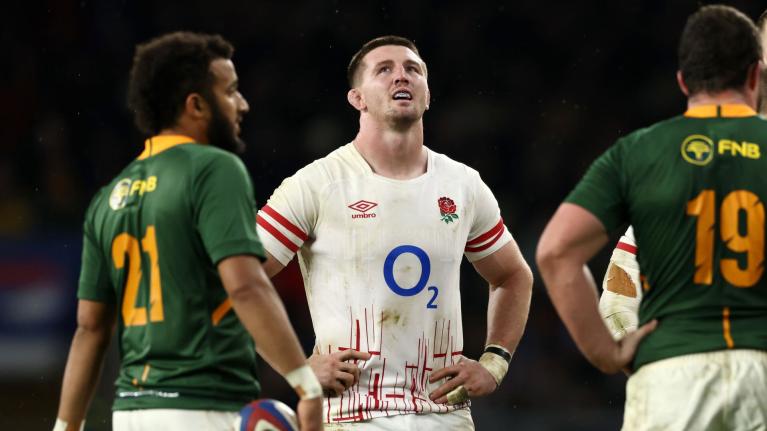England booed off the field after coming distant second to South Africa

England collapsed to their first defeat by South Africa at Twickenham for eight years as an autumn of crushing disappointment concluded with a 27-13 rout.
Eddie Jones’ men delivered the worst performance of a campaign consisting of a solitary victory over Japan as the 14-man Springboks, inspired by half-backs Faf de Klerk and Damian Willemse, dominated the rematch of the 2019 World Cup final.
By the end of the first half, England had spent only six seconds in the opposition 22 with their backline reduced to virtual bystanders by a vast error count and the familiar disciplinary issues.
The most brainless moment arrived shortly after the break when Jonny Hill flung De Klerk out of a ruck, prompting referee Angus Gardner to reverse a penalty, and seconds later Eben Etzebeth was over to extend the lead to 24-6.
Unlike their mesmerising comeback against New Zealand a week earlier, there were no late heroics this time even after replacement prop Thomas du Toit had been sent off in the 60th minute for a dangerous challenge on Luke Cowan-Dickie.
Henry Slade dashed over in the 72nd minute – the same stage at which the 25-25 draw with the All Blacks was made possible – but pedestrian England had rarely threatened amid a lack of ideas or tempo in attack.
In contrast, the Springboks lit up Twickenham on an otherwise drab evening by running in a sensational try through Kurt-Lee Roux that was born out of Willemse’s brilliance.
Signalling their discontent, the home fans booed when the final whistle sounded.
Unfortunately for South Africa director of rugby Rassie Erasmus, he was not present to witness a comprehensive victory as he completed a two-match ban for criticising referees during the Autumn Nations Series.
Erasmus’ actions meant the half-time presentation intended to mark Wayne Barnes’ 100th Test as a referee was cancelled out of fear he might receive abuse after he was targeted online having overseen the Springboks’ defeat by France.
It was clear early on that Gardner had a job on his hands with multiple reset scrums and extensive back chat from both sides keeping him busy.
A high error count scarred the first half and, once De Klerk and Farrell had missed simple penalties, the Springboks scrum-half drew first blood.
Farrell missed a penalty and, when Alex Coles was penalised for the second time, South Africa used their line-out to turn the screw with Siya Kolisi held up over the line.
England were unable to escape their half and, shortly after Willemse landed a drop goal, the Springboks fly-half launched a stunning counter-attack starting on his own 22.
Accelerating into space and with help from a block on Steward, he found Willie le Roux, who presented Roux with a one-on-one against Marcus Smith that the Bulls wing completed through his sheer pace.
Willemse was causing havoc as he broke free once more and, once England had been warned for repeated defensive infringements, De Klerk increased the lead to 14-3.
England changed their entire front row and also brought on wing Jack Nowell for the second half but it made no difference to South Africa as Willemse booted another drop goal.
Farrell replied with a penalty but Hill’s moment of madness with De Klerk allowed the Springboks to attack and, with Tom Curry sent to the sin-bin for a ruck offence, Etzebeth touched down under the posts.
De Klerk converted and rifled over another three points only for Du Toit to receive his marching orders.
England were finally over in the 72nd minute, Slade darting over to end a long-range move started by Nowell, but they had nothing left in the tank against a resolute South Africa.
Latest Comments
Totally. Peak ‘Heineken Cup’ was a level above most test matches.
The 2011 RWC semi-finals and final. Compared with the Heineken Cup semi-finals and final that same year.
Go to commentsAll Blacks need BOTH Mo’unga and McKenzie at 2027 RWC.
Barrett will be 35 and his pace and skills are in decline and he rarely takes the ball into contact any more and has not for a few seasons, thus his tendency to kick first, pass second, run third. Barrett has this season in the All Blacks and then his time is up.
Hopefully Cotter starts Perofeta at 10 the rest of the Blues’ season and Perofeta steps up and finally reaches his potential as a 10.
Go to comments